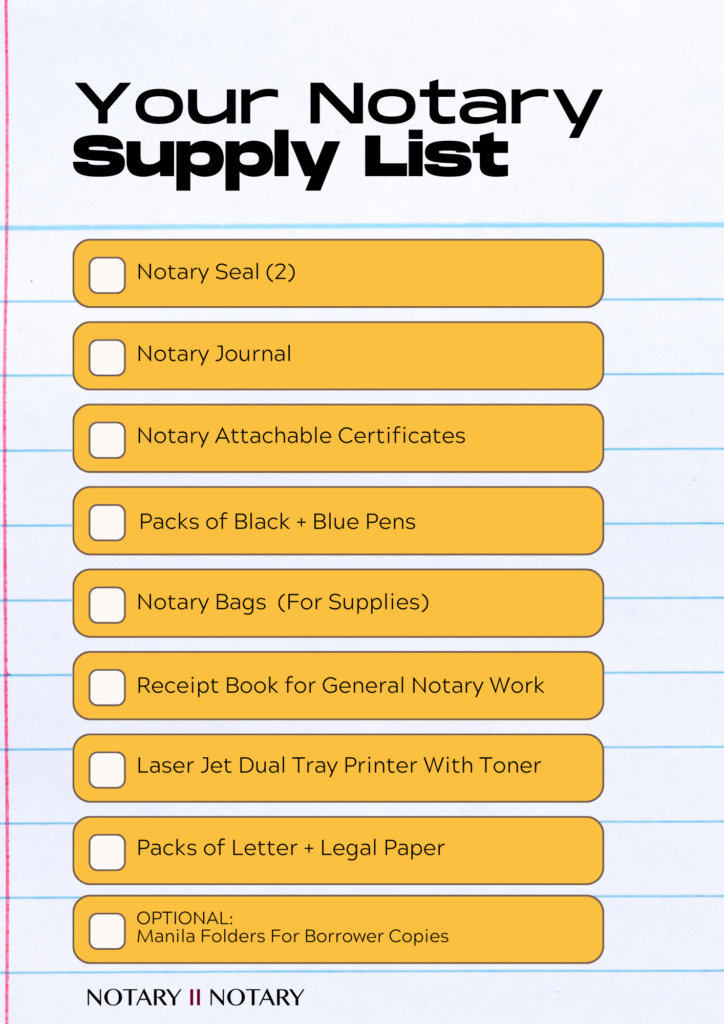As a professional notary, it is important to have the proper supplies to ensure that your work is completed efficiently and effectively.
Here is a list of essential items that every notary should have:

- Notary Seal (2): It is important to have at least two notary seals, in case one goes missing or becomes damaged.
- Notary Journal: A notary journal is essential for recording all notarizations, including the date, time, location, and names of all parties involved.
- Notary Attachable Certificates: These certificates can be attached to documents that need to be notarized, providing proof of authenticity.
- Notary Bags (For Supplies): Notary bags are a convenient way to store and transport all of your notary supplies.
- Receipt Book for General Notary Work: A receipt book is useful for keeping track of payment for notary services.
- Packs of Black and Blue Pens: Black and blue pens are typically required for notarization, so it is important to have a supply on hand.
- Laser Jet Dual Tray Printer With Toner: A laser jet printer is useful for printing documents that need to be notarized.
- Packs of Letter and Legal Paper: Having a supply of both letter and legal paper is essential for any notary.
Optional: Manila Folders for Borrower Copies: Manila folders can be used to store copies of documents for borrowers.
By having these essential notary supplies on hand, you can ensure that your notary work is completed smoothly and efficiently.

Can a Notary Public Notarize for Family?
It’s a super common situation: your spouse, parent, sibling, or adult child needs something notarized, and you’re the closest notary around. So the big question

How to Become a Mobile Notary in Texas?
A “mobile notary” in Texas isn’t a different license — it’s a Texas notary public who travels to the signer (home, office, hospital, jail, coffee
Start An Apostille Business.
Start An Apostille Business Starting an apostille business can be a rewarding venture, especially as global interactions increase and the need for legal document verification grows. Whether you’re looking to expand your notary services or begin a new business, understanding the essentials of apostille services is crucial. This guide will walk you through the steps to establish and grow your apostille business. An apostille is a certificate that authenticates the signature of a public official on a document for use in another country. This is crucial for documents such as birth certificates, marriage licenses, and educational degrees when they need to be recognized internationally. The Hague Apostille Convention of 1961 established this process to simplify the legalization of documents across borders. Why Start an Apostille Business? As more people travel, work, and live abroad, the demand for apostille services is on the rise. Here are some compelling reasons to start your own apostille business: Growing Demand: With increasing globalization, the need for document verification across countries is expanding. Low Startup Costs: Compared to other businesses, an apostille service can be started with minimal investment. Flexible Work Environment: You can operate from home or add it to existing notary services. Helping Others: You’ll be assisting clients in overcoming bureaucratic hurdles, which can be very satisfying. Steps to Start an Apostille Business 1. Understand the Legal Requirements Before you start, it’s important to understand the legal framework for providing apostille services. In the U.S., each state has its own procedures, so you’ll need to be familiar with your state’s requirements. Generally, you’ll need to: Be a commissioned notary public Understand state-specific apostille regulations Ensure compliance with the Hague Apostille Convention 2. Get the Necessary Training While not legally required in all cases, getting proper training can set you apart from competitors. Consider enrolling in courses offered by reputable organizations like Notary2Notary, which provide comprehensive training on apostille services, including handling various documents and understanding international regulations. 3. Set Up Your Business Once you’re trained, it’s time to set up your business. Here’s how: Create a Business Plan A solid business plan outlines your business goals, target market, and financial projections. It should include: A description of your services

